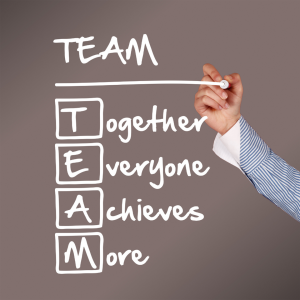Home > Implementation for Educators Blog

Teamwork makes the dream work!
There is no “I” in team.
Team means Together Everyone Achieves More.
“Alone we can do so little; together we can do so much.” -Helen Keller
So, is there something more to teams than just groups of people who periodically come together? From these quotes, it sounds like teams who work together accomplish great things. What makes that difference? How do teams, or implementation teams as we think about them in our work, become the catalyst to achieving more? It may be time to take a quick journey talking about what makes implementation teams – or any team – effective and how we can work toward making any team “do so much together” to reach goals that are not achieved alone.
Let’s start with defining effective teams.
Effective teams:
- are manageable in size – typically 5-7 individuals, which is large enough to capture broad perspectives and viewpoints but small enough to tackle tasks without stepping on toes;
- have time allocated to engage in developing implementation supports. Time allocated means working together as a team, as well as work completed between meetings.
- Co-develop agreed-upon ways of work so that everyone knows the roles and expectations for their work together;
- actively work to capture and engage all voices in their work;
- follow consistent schedules for meeting, which includes starting and ending on time; and
- take accountability for their work on supporting the full and effective use of practices that lead to outcomes they are charged with achieving.
Next, how do effective implementation teams function?
Implementation teams “make it happen” by ensuring that best practices in selection, implementation, and monitoring of ongoing improvement take place. To accomplish this, implementation teams use data that informs them of the health and well-being of the system and the people around them. Are there challenges, struggles, or barriers that are preventing robust practices from happening? Remember, effective teams are purposefully designed to drive outcomes and constantly look for the most effective, efficient, and balanced ways to get there. Part of this work includes identifying when there are challenges that the team cannot solve on their own and, as a result, the team lifts these needs to those who can resolve the hindering barriers for “making it happen.”
Finally, how do we develop effective, efficient, and balanced implementation teams?
We start by identifying the essential ingredients – what do we need on the team? Voices, perspective, skills, persistence, positivity, and some humor! Think selection criteria – we may need individuals (remember 5-7) who have a diverse array of:
- experience implementing a practice
- an improvement mindset
- history of work at the practitioner level
- position in the agency
- skills for engaging, collaborating, and building relationships with leadership and stakeholders
- experience delivering the practice
- fluency with data
- knowledge of the components of the selected program or practice and the connection to outcomes
- ability to work amid ambiguity
What else may you need as your essential ingredients? Importantly, not all skills and perspectives are found within all individuals. We also do not always have to develop a brand-new team. Often, we can repurpose or redesign an existing team who can be charged with this work. Additionally, we must create a team that is resilient to turnover – it will happen! As such, we must design our team with sustainability of the roles and responsibilities in mind. For example, we may consider having backup individuals ready to step into a critical role at a moment’s notice. We also will constantly cultivate skills in a space that molds future leaders. Regardless of where we are in the process, we must continually assess our teams to ensure that we have all perspectives needed to make informed and collaborative decisions on our journey together to our end goals.
As we end this quick journey, we would like to highlight a few big ideas. It is not enough to have a team; we must truly have an effective, efficient, and balanced implementation team. An effective, efficient, and balanced implementation team comprises the appropriate stakeholders who are willing to work together towards a common goal. If built appropriately, effective teams are tasked and accountable for “making it happen.”
Your charge is to take stock of your implementation teams and examine if they are truly effective, efficient, and balanced. Are they making it happen? If not, you know where to begin. If so, share with us your tips, learnings, and actionable steps that made your Implementation Teams the catalyst to achieving outcomes.
Resources
Module 3: Implementation Teams
Establishing Implementation Teams (see PDF pages 15-16)
Implementation Teams: Working Agreements (or Terms of Reference) (see PDF page 17)
Fixsen, D. L., Naoom, S. F., Blase, K. A., Friedman, R. M. & Wallace, F. (2005). Implementation Research: A Synthesis of the literature. The National Implementation Research Network.

